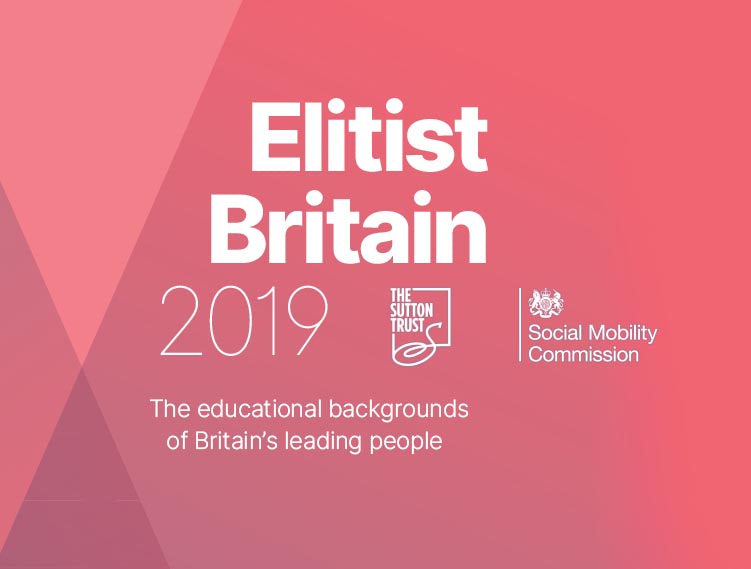For too long professions like law, politics and journalism have been dominated by independently schooled people

Elitist Britain – Sutton Trust & Social Mobility Commission report
Commenting on Elitist Britain 2019, a report from the Sutton Trust and Social Mobility Commission which looks at the educational background of over 5,000 of Britain’s leading and “influential” people, Kevin Courtney, Joint General Secretary of the National Education Union, said:
“As this research makes clear, Britain is a deeply divided and unequal class-based society with those in the most powerful and prestigious professions much more likely to have attended private schools and Oxbridge than the country as a whole, despite these institutions educating a tiny minority of the population.
“It is simply unacceptable that in the 21st century, the biggest indicator of future employment, wealth and status is the school or university you attended and the wealth and social position of your parents.
“This research comes on top of other alarming evidence of growing inequality in Britain. The recent report from the UN special rapporteur on Poverty, Philip Alston, described poverty in the UK as ‘systematic’ and ‘tragic’ and said that our Government ‘has remained determinedly in a state of denial’. In addition, research highlighted yesterday showed that life expectancy in Britain is faltering, reversing a 100-year trend of growing life expectancy.
“There were 4.1 million children living in poverty in the UK in 2016-17. That’s 30 per cent of children, or 9 in a classroom of 30. Despite the Government’s claims that more people are in work, the fact is that work is not a route out of poverty, since among poor children, two thirds live in a household where at least one adult is working. (3)
“It is clear that the Government’s emphasis on ‘social mobility’ has failed. Instead, Government must commit to tackling and ending poverty and inequality in the UK.”
A Department for Education spokesperson said:
“For too long professions like law, politics and journalism have been dominated by independently schooled people. By making sure that our state schools offer a comparable education to private schools we will drive down these inequalities.
“The gap between state funded schools and independent schools has never been smaller. 85% of state funded schools are now rated good or outstanding – compared to 68% in 2010 and academies across the country like Brampton Manor in East London are rivalling the results of prestigious private schools.
“This has been driven by a range of reforms focusing on levelling the playing field and strengthening education from the bottom up. Phonics is helping early literacy, more pupils leave primary school meeting the expected standards in maths and English and our reformed GCSEs make sure 16-year-olds have the knowledge parents expect.”
“We’ve set up a partnerships programme that allows state schools, private schools and universities to share their expertise and resources.
“The gap between disadvantaged pupils and their peers has narrowed and the proportion of 16 and 17-year-olds in education or apprenticeships is at its highest ever.
“Our primary pupils reached their highest ever score in international reading tests in 2016, and in 2018 163,000 more six-year-olds were on track to become fluent readers compared to 2012, when we introduced the phonics screening check.
“We have introduced reforms to make sure that higher education is open to everyone who has the talent and potential – and there is a record rate of disadvantaged 18-year-olds entering full time higher education, but it is important that we build on this progress.
“The national funding formula for 16-19 year olds includes extra funding for disadvantaged students and we have protected the base rate of funding until the end of the current spending review period in 2020. The proportion of 16 and 17-year-olds in education or apprenticeships is at a record high.”











Responses